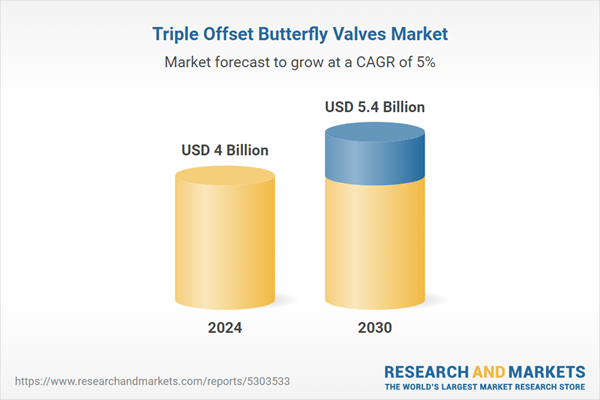Global Triple Offset Butterfly Valve Market - Key Trends & Drivers Summarized
What Exactly Are Triple Offset Butterfly Valves, and Why Are They So Crucial?
Triple Offset Butterfly Valves (TOBVs) are precision-engineered valves that play an integral role in managing high-pressure and high-temperature operations across various industries. The “triple offset” design refers to the three distinct offsets that enable frictionless sealing and tight shut-off. This design offers key advantages: the first offset allows the disc to move away from the sealing surface, the second offset ensures the disc cam action, and the third offset prevents friction between sealing components until the final closure. This unique construction makes TOBVs well-suited for critical industries such as oil & gas, petrochemicals, power generation, and shipbuilding, where performance, safety, and reliability are paramount. These valves can efficiently handle corrosive fluids, superheated steam, and other challenging media, making them indispensable for high-integrity applications. Moreover, their durability, low maintenance, and cost-efficiency contribute to lower total cost of ownership, making TOBVs a popular choice among industries that demand longevity and minimal downtime.As regulatory standards tighten globally, particularly regarding emissions control and operational safety, industries are increasingly turning to TOBVs for compliance and operational efficiency. Their leak-tight sealing capabilities are essential in preventing fugitive emissions, a critical concern for industries seeking to meet stringent environmental norms. Additionally, the valves' lightweight design makes installation easier and reduces the overall load on pipeline infrastructure, adding to their appeal in retrofitting projects. The rising focus on energy efficiency, resource optimization, and sustainable industrial operations further propels the adoption of TOBVs, as they not only support seamless operations but also contribute to meeting sustainability targets. The increasing reliance on TOBVs across a variety of industrial sectors showcases their role as a key component in modern engineering solutions.
How Are Technological Advancements Shaping the Evolution of TOBV Market?
Technological innovation has been instrumental in driving the evolution of Triple Offset Butterfly Valves. Material advancements, such as the adoption of exotic alloys, high-performance composites, and ceramics, have significantly improved the valves' resilience against corrosion, heat, and mechanical wear. These upgrades have made TOBVs suitable for use in more aggressive environments, such as sour gas processing, chemical production, and offshore oil drilling. Additionally, the development of automated TOBVs integrated with IoT sensors has revolutionized valve management, allowing real-time data monitoring, remote operations, and predictive maintenance. This advancement reduces operational downtime, enhances safety, and minimizes repair costs, making TOBVs even more appealing to industries that prioritize automation and efficiency. Integration with AI-driven systems and digital twin technology further enables predictive analytics and simulations that optimize valve performance, predict failures, and support proactive maintenance strategies without interrupting operations.Moreover, Industry 4.0 practices have brought a new level of sophistication to the TOBV market, aligning it with global trends of digitization, automation, and intelligent systems. Smart TOBVs can now communicate with centralized systems, offering insights into performance metrics, fluid dynamics, and potential leakages. This interconnectedness enhances the role of TOBVs in automated process control, boosting productivity and reducing human intervention. As industries continue to digitize operations, the demand for high-tech, AI-integrated, and IoT-enabled TOBVs is expected to rise, particularly in sectors such as LNG processing, green hydrogen production, and large-scale chemical plants where precision, safety, and compliance are essential.
What Are the Emerging Applications of TOBVs Across Industries?
The application landscape for Triple Offset Butterfly Valves is rapidly expanding, driven by increasing industrial requirements for high-performance, versatile, and safe valve solutions. While TOBVs have long been established in oil & gas, power generation, and petrochemical industries, they are now gaining traction in emerging sectors such as water treatment, pharmaceuticals, and food & beverage processing. In desalination plants, for instance, TOBVs are becoming the valve of choice due to their ability to withstand corrosive saltwater environments while maintaining a tight shut-off. The pharmaceutical industry also benefits from TOBVs' design, which ensures sterile fluid handling and compliance with hygiene standards. Meanwhile, the food & beverage industry requires valves that prevent contamination and ensure leak-proof operations, making TOBVs ideal for processing lines that handle sensitive materials. The ongoing adoption of TOBVs in geothermal energy projects, LNG facilities, and hydrogen production also points to the valves' adaptability to handle extreme temperatures and pressures in newer energy sectors.The retrofitting of aging infrastructure with TOBVs is another emerging trend, particularly in regions with outdated pipeline networks or older industrial facilities. The lightweight construction and compact design of TOBVs make them suitable for retrofit applications, allowing industries to upgrade their systems without major modifications. As global infrastructure ages, particularly in developed economies, industries are increasingly looking to replace older valve systems with modern, high-performance TOBVs that meet current safety and environmental standards. The demand for TOBVs is also being fueled by infrastructure expansion in developing regions, where new industrial facilities prioritize efficiency, cost savings, and sustainability. This broader application scope not only highlights the versatility of TOBVs but also underscores their importance in both traditional and evolving industries.
What Drives Growth in the TOBV Market?
The growth in the Triple Offset Butterfly Valve market is driven by several factors, including rising global energy demands, rapid industrialization, and stringent environmental regulations. One of the most significant drivers is the boom in oil & gas exploration, particularly offshore and deepwater projects that require durable, high-performance valves like TOBVs to manage high-pressure, corrosive media. Simultaneously, the expansion of renewable energy projects, such as solar power and green hydrogen facilities, has increased the need for robust valves capable of handling thermal fluids and gases safely. This shift towards renewable energy infrastructure is creating new opportunities for TOBV adoption, especially as industries align with global sustainability goals. Another driver is the increased focus on water infrastructure in emerging economies, where governments are investing in water treatment, desalination, and wastewater management projects that require reliable and corrosion-resistant valve solutions.Moreover, the adoption of industrial automation and smart technologies across sectors has further accelerated the demand for advanced TOBVs. End-users are seeking valves that not only enhance operational safety and efficiency but also support digitalization initiatives, such as predictive maintenance and IoT-based monitoring systems. Additionally, the push to reduce fugitive emissions and achieve zero-leakage performance has bolstered TOBV installations, as they align with safety and environmental compliance standards. The trend of upgrading and refurbishing existing industrial facilities to improve efficiency and sustainability is also driving the demand for modern TOBVs, particularly as industries seek to optimize operations while minimizing downtime. As the global focus on sustainable production and resource conservation intensifies, the TOBV market is poised for sustained growth, driven by both technological advancements and evolving industry demands.
Report Scope
The report analyzes the Triple Offset Butterfly Valves market, presented in terms of market value (US$ Thousand). The analysis covers the key segments and geographic regions outlined below.- Segments: Material (Stainless Steel, Cast Iron, Cryogenic, Alloy Based, Other Materials); Application (Oil & Gas, Energy & Power, Water & Wastewater Treatment, Chemicals, Food & Beverages, Pharmaceutical & Healthcare, Other Applications).
- Geographic Regions/Countries:World; United States; Canada; Japan; China; Europe (France; Germany; Italy; United Kingdom; and Rest of Europe); Asia-Pacific; Rest of World.
Key Insights:
- Market Growth: Understand the significant growth trajectory of the Stainless Steel Material segment, which is expected to reach US$2.2 Billion by 2030 with a CAGR of a 5.4%. The Cast Iron Material segment is also set to grow at 4.3% CAGR over the analysis period.
- Regional Analysis: Gain insights into the U.S. market, valued at $1.1 Billion in 2024, and China, forecasted to grow at an impressive 4.9% CAGR to reach $855.7 Million by 2030. Discover growth trends in other key regions, including Japan, Canada, Germany, and the Asia-Pacific.
Why You Should Buy This Report:
- Detailed Market Analysis: Access a thorough analysis of the Global Triple Offset Butterfly Valves Market, covering all major geographic regions and market segments.
- Competitive Insights: Get an overview of the competitive landscape, including the market presence of major players across different geographies.
- Future Trends and Drivers: Understand the key trends and drivers shaping the future of the Global Triple Offset Butterfly Valves Market.
- Actionable Insights: Benefit from actionable insights that can help you identify new revenue opportunities and make strategic business decisions.
Key Questions Answered:
- How is the Global Triple Offset Butterfly Valves Market expected to evolve by 2030?
- What are the main drivers and restraints affecting the market?
- Which market segments will grow the most over the forecast period?
- How will market shares for different regions and segments change by 2030?
- Who are the leading players in the market, and what are their prospects?
Report Features:
- Comprehensive Market Data: Independent analysis of annual sales and market forecasts in US$ Million from 2024 to 2030.
- In-Depth Regional Analysis: Detailed insights into key markets, including the U.S., China, Japan, Canada, Europe, Asia-Pacific, Latin America, Middle East, and Africa.
- Company Profiles: Coverage of players such as ADAMS Armature GmBH, Advanced Valve Design, ARI Valve Corp, Assured Automation, Belimo Americas and more.
- Complimentary Updates: Receive free report updates for one year to keep you informed of the latest market developments.
Some of the 38 companies featured in this Triple Offset Butterfly Valves market report include:
- ADAMS Armature GmBH
- Advanced Valve Design
- ARI Valve Corp
- Assured Automation
- Belimo Americas
- Bray International
- Cameron
- CRANE ChemPharma & Energy
- Dembla Valves Ltd
- Emerson
- Hobbs Valve
- JC Valves
- L&T Valves
- North American Machine Works
- Northeast Fluid Controls
- OHL Gutermuth Industrial Valves GmbH
- Pentair Valves & Controls
- The Weir Group
- Value Valves Co., Ltd
- Velan
This edition integrates the latest global trade and economic shifts into comprehensive market analysis. Key updates include:
- Tariff and Trade Impact: Insights into global tariff negotiations across 180+ countries, with analysis of supply chain turbulence, sourcing disruptions, and geographic realignment. Special focus on 2025 as a pivotal year for trade tensions, including updated perspectives on the Trump-era tariffs.
- Adjusted Forecasts and Analytics: Revised global and regional market forecasts through 2030, incorporating tariff effects, economic uncertainty, and structural changes in globalization. Includes historical analysis from 2015 to 2023.
- Strategic Market Dynamics: Evaluation of revised market prospects, regional outlooks, and key economic indicators such as population and urbanization trends.
- Innovation & Technology Trends: Latest developments in product and process innovation, emerging technologies, and key industry drivers shaping the competitive landscape.
- Competitive Intelligence: Updated global market share estimates for 2025, competitive positioning of major players (Strong/Active/Niche/Trivial), and refined focus on leading global brands and core players.
- Expert Insight & Commentary: Strategic analysis from economists, trade experts, and domain specialists to contextualize market shifts and identify emerging opportunities.
Table of Contents
Companies Mentioned (Partial List)
A selection of companies mentioned in this report includes, but is not limited to:
- ADAMS Armature GmBH
- Advanced Valve Design
- ARI Valve Corp
- Assured Automation
- Belimo Americas
- Bray International
- Cameron
- CRANE ChemPharma & Energy
- Dembla Valves Ltd
- Emerson
- Hobbs Valve
- JC Valves
- L&T Valves
- North American Machine Works
- Northeast Fluid Controls
- OHL Gutermuth Industrial Valves GmbH
- Pentair Valves & Controls
- The Weir Group
- Value Valves Co., Ltd
- Velan
Table Information
| Report Attribute | Details |
|---|---|
| No. of Pages | 191 |
| Published | February 2026 |
| Forecast Period | 2024 - 2030 |
| Estimated Market Value ( USD | $ 4 Billion |
| Forecasted Market Value ( USD | $ 5.4 Billion |
| Compound Annual Growth Rate | 5.0% |
| Regions Covered | Global |









